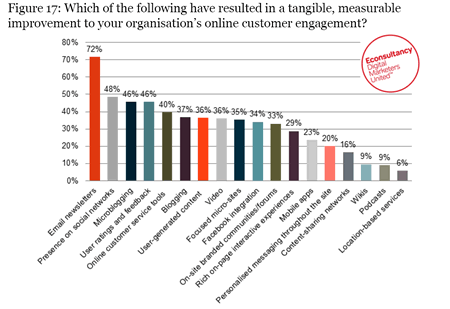Customer Engagement: Social Media & Email Marketing

Earlier this year, Econsultancy published the 2011 edition of its Customer Engagement Report.
The report looks at the changes in customer behavior and how companies try to increase customer engagement and the findings are very interesting.
The Use of Social Media Delivers Results
It will come as no surprise that social media are increasingly being used for engaging customers. Whilst it may seem obvious that the social networks are being embraced by more and more marketers these days, the extent of it's use it is still quite remarkable.
Despite the entire buzz around social media marketing, it pays to be mindful that many companies are still waiting, on the outskirts of all the activity, not knowing what they should do with social networks.
The highlights of the Econsultancy report illustrate that social media marketing is being successfully incorporated into the Customer Engagement strategies of major organisations globally.
Specifically, the following five statistics were particularly interesting:
- 48% of respondents feel that an active presence on social networks leads to a tangible improvement of the online Customer Engagement.
- 46% feels the same about micro-blogging (being mainly Twitter)
- 7% more companies use social networks for innovation and product development than in the report’s 2010 edition.
- The number of companies that use social networks has increased by 15% on year basis.
- 58% of respondents say they want to invest more in social networks.

Email Newsletters Are The Most Used Tactic For Customer Engagement
Social media was not the most important grower regarding Customer Engagement tactic. Email marketing which, according to 72% of the respondents, leads to a tangible improvement of the online client engagement is (still) regarded as the most important tactic used by online marketers.
Furthermore, 62% of the respondents are planning to invest more in email newsletters. This is also more than in social networks.
Email marketing is not dead and, according to the respondents of the survey, is viewed as a growth tactic by organisations globally.

